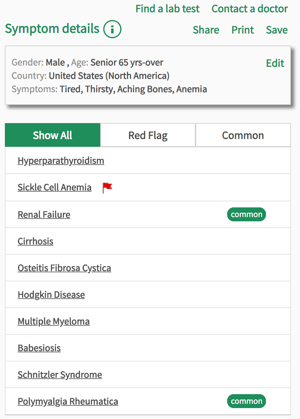- Privacy Policy
- Terms & Conditions
- Contact us
- ©Isabel Healthcare 2025
Could I have myeloma? Myeloma and blood cancer symptoms
 This blogpost is another instalment of our in-depth look at specific blood cancers. We’ve written an overview of blood cancers, touching on the 3 main types. We have written posts about Hodgkin’s and non-Hodgkin’s Lymphoma, and leukemia. This week, we’re going into more detail with myeloma, a type of blood cancer inside the bone marrow. We’ll go over the definitions, types, and symptoms of myeloma, as well as helping you know what treatments are available and how to get help if you are concerned.
This blogpost is another instalment of our in-depth look at specific blood cancers. We’ve written an overview of blood cancers, touching on the 3 main types. We have written posts about Hodgkin’s and non-Hodgkin’s Lymphoma, and leukemia. This week, we’re going into more detail with myeloma, a type of blood cancer inside the bone marrow. We’ll go over the definitions, types, and symptoms of myeloma, as well as helping you know what treatments are available and how to get help if you are concerned.
A recap - what is blood cancer?
Cancer occurs when cells in the body start to grow abnormally and out of control, usually multiplying at a fast rate to form an abnormal growth or tumor. Blood cancers, however, are the only type of cancer that don’t necessarily involve a tumor or growth anywhere, because our blood cells are constantly moving and renewing. In some rare cases, tumors can form in the bone marrow. There are different types of blood cells, but they all started out as stem cells in the bone marrow, and the type of blood cancer you have depends on where and what point in the process these cells malfunction and become abnormal.
What is myeloma?
Myeloma is a blood cancer that originates in the bone marrow itself, and affects specific white blood cells called plasma cells. Bones have a spongy tissue in the centre called bone marrow, and it is here that blood cells are produced. White blood cells are made to help our bodies fight off infection. Plasma cells are able to secrete a large amount of antibodies needed to do this, and are very important for our bodies to stay healthy. Myeloma occurs when these plasma cells do not mature properly, and then grow at a faster rate than normal. There is then an overload of immature plasma cells, which has two main effects: there is no longer enough room for the healthy red and white blood cells to grow and thrive and; the bones weaken because there is an overproduction of osteoclasts, which are designed to break down bone. These effects can happen in any bone that has bone marrow, anywhere in the body.
Types of myeloma
There are 3 main types of myeloma, depending on the type of antibody that is produced by the abnormal plasma cell. Antibodies, or immunoglobulins, are made up of both heavy chains of proteins and light chains of proteins. The heavy chains are denoted by the letters G, A, E, D, or M, and the light chains are either kappa (κ) or lambda (λ). The type of myeloma you are told you have could be, for example, IgG kappa, the most common form of immunoglobulin, meaning it is these particular cells that are growing abnormally. These different types of myeloma can affect you in slightly different ways, but they don’t normally have any difference in how they are treated.
Myeloma symptoms
Myeloma is a slowly developing disease, so many people don’t notice any symptoms until the disease is quite far advanced, or discover it through a routine blood test for another condition. Some symptoms that are an indication of myeloma are:
- Bone pain or aches
- Unexplained fractures, particularly in the spine
- Unexplained bruising
- Fatigue
- Unexplained weight loss
- Increased thirst
- Infections, or getting ill a lot
- Anemia - a low count of red blood cells and iron
Complications of myeloma
Because myeloma is a blood cancer that affects the entire body, there are many other secondary conditions that may occur. What’s more, myeloma affects the white blood cells, meaning fighting off infections throughout the body becomes more difficult. Some secondary conditions that can occur are:
- Kidney problems - kidneys filter through our blood and remove what we don’t need. If the blood is unhealthy, this can cause a build up of unhealthy cells in the kidneys and they struggle to function properly.
- Spinal cord compression - weakened bones mean the spine is unable to support its own weight in some cases, and this presses on the spinal cord. This in turn causes numbness and nerve problems throughout the body
- Hypercalcemia - As the bones weaken and break down, there is much more calcium in the body and blood stream. This can cause all sorts of problems such as dehydration, dizziness and even comas.
Treatment of myeloma
There is no cure for myeloma, but treatments can be quite effective in controlling symptoms and bringing people into a period of remission, where the abnormal cells are not being produced. Relapses can occur, however, during which additional treatment is then needed to regain control. Sometimes no treatment is needed for quite some time, until the symptoms become too hard to manage. Medicines such as steroids and thalidomides can help kill cancerous cells, and these are normally combined with chemotherapy pills, again to try and kill the cancerous cells and encourage the body to start producing more healthy cells and get back in control. In younger and fitter people, sometimes stem cell transplants are an option. These can either be taken from your own bone marrow in places where the cells are still healthy, or in rare cases be given by someone else who is a good match for your cells.
If you are concerned about any of the symptoms or topics discussed in this blogpost, we recommend you place everything into our free Isabel Symptom Checker, and book an appointment with your doctor to discuss the results.

Mandy Tomlinson
Mandy has worked for Isabel Healthcare since 2000. Prior to this, she was a Senior Staff Nurse on the Pediatric Infectious disease ward and high dependency unit at one of London's top hospitals, St Mary’s in Paddington which is part of Imperial College Healthcare NHS Trust. Her experience in the healthcare industry for the past 33 years in both the UK and USA means she's a vital resource for our organization. Mandy currently lives and works in Scottsdale, Arizona.
Subscribe Here!
Recent Posts
Isabel DDx Companion with ChatGPT Integration - to help you diagnose even faster
At Isabel Healthcare, we’ve always been driven by one goal: to make clinical reasoning faster,..Virtual Triage: Do more questions lead to better patient outcomes?
One of the common misconceptions related to virtual triage / symptom checker tools is that the more..List Of Categories
- Differential Diagnosis Decision Support
- Differential diagnosis
- Symptom Checker
- Symptoms
- Medical Error
- Patient Disease Information
- Disease
- Clinical Decision Support
- Diagnostic Decision Support
- Isabel 1 Minute Read
- Diagnosis Error
- Diagnosis Skills Cases
- Healthcare Informatics
- Clinical Reasoning
- Evidence-based Medicine
- Medical Education
- Patient Engagement
- Symptom Triage
- Nurse Practitioner Education
- Nursing Decision Support
- Partnership
- Public Health
- COVID-19
- EHR
- Patient Empowerment
- Patient Safety
- rare disease

Start your FREE Trial today
Try the Isabel Pro DDx generator for 30-days - no payment card details required.




